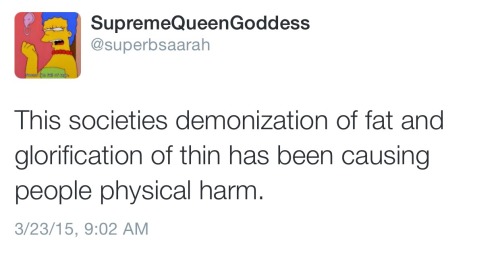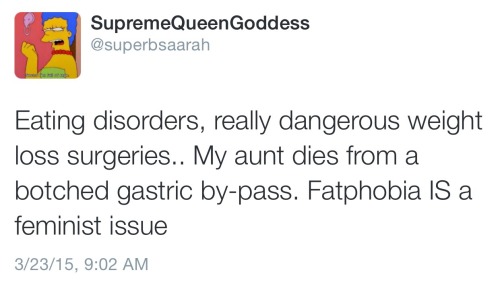dogsonline:andreseward:crawlboy:andreseward:kmenas:fiercefatfeminist:*died!!!*question* what about a
dogsonline:andreseward:crawlboy:andreseward:kmenas:fiercefatfeminist:*died!!!*question* what about all the people who are dying from diseases and disorders caused from being serioulsy overweight? hmmm?When does just being a little thick/fat cross into being obese and dangerously so?why would you put a comment like this on a post where someone is talking about a loved one who died because of rhetoric like this? go do your research instead of spewing this shit “According to the National Institutes of Health, obesity and overweight together are the second leading cause of preventable death in the United States, close behind tobacco use (3). An estimated 300,000 deaths per year are due to the obesity epidemic (57). The results of two extensive studies examining obesity-attributable deaths in the United States were published in 1999. Allison, Fontaine, and Manson et al., reporting in the Journal of the American Medical Society, sed data from a number of prospective cohort studies, including the Alameda Community Health Study, the Framingham Heart Study, the Tecumseh Community Health Study, the American Cancer Society’s Cancer Prevention Study I, the National Health and Nutrition Examination Survey I Epidemiologic Follow-up Study, and the Nurses’ Health Study, to estimate the number of deaths attributable to obesity in the United States on an annual basis (66). Their initial analyses, which examined deaths occurring among persons aged 18 and older in 1991, were adjusted only for age, sex, and smoking status. The weight categories used were overweight (BMI of 25-29.9), obese (BMI of 30-35), and severely obese (BMI >35).”https://www.wvdhhr.org/bph/oehp/obesity/mortality.htmThe purpose of this study was to assess characteristics of individuals who died from anorexia nervosa by assessing the frequency with which anorexia nervosa is listed as a causal factor related to the death of individuals in the USA. Data from over 10 million death records (all National Center for Health Statistic registered deaths in the USA for 1986-90) were examined for mention of anorexia nervosa as a primary or contributing cause of death. Only 724 were found, which equals an average of 145 annual deaths, and a rate of 6.73 per 100,000 deaths. The age and sex distribution suggests two fatal forms of anorexia nervosa, an early-onset form comprising 89% women and a later form comprising 24% men. The findings suggest that the mortality risk from current anorexia nervosa may be lower than formerly supposed and that it is not confined to young adults and adolescents.http://www.ncbi.nlm.nih.gov/pubmed/11513012https://www.nationaleatingdisorders.org/mortality-and-eating-disordersThere is definitely something to be said about body positivity, it can be great. But you can not and should not say “some people die due to eating disorders, so ‘fat shaming’ is bad” and completely ignore the much greater mortality risk of obesity/ being severely overweight.heres the thing: literally nobody is unaware that there are health risks associated clinically with being a certain size. they hear about it every day, more and more depending on how big they are. its not helpful, its rude, and if you are sincerely concerned, read about how the annoying attitude you have is contributing to killing people.heres a review of over 150 studies about the intense constant stigma that fat women face. do you think people choose that? really? do you think people want to be treated that way and would just stop being so fat if they would just LISTEN when you tell them its UNHEALTHY? youre TOTALLY helping, and not just being an asshole because you dont think fat people are people so youve never really bothered to think this through? heres some other stuff to think about. some of these links focus on women because theyre generally affected much more intensely.More frequent exposure to stigmatization was associated with greater psychological distress, more attempts to cope, and more severe obesity. Certain coping strategies are associated with greater distress.A three-way interaction was detected between participant sex, defendant sex and defendant weight on perceptions of guilt such that when the defendant was female, male participants were significantly more likely to find her guilty if she was obese than if she was lean (guilt ratings=4.05±0.83; 3.31±1.03, respectively; F(1467)=5.935, P=0.015, R(2)=0.060). In addition, lean male participants were significantly more likely to believe that the obese female defendant met criteria for check fraud, and indicated greater belief she would be a repeat offender, compared with the lean female defendant (t(90)=2.081, P=0.040; t(90)=2.395 P=0.019, respectively).Conclusion: Obese women are faced with social stigma. Due tofeminine body features and masculine socio-culturalstructures, obesity is a gender-based phenomena. Thisresearch showed that obese women use five copingstrategies when they confront with stigmatization.Four methods lead to personal and social restrictions.In one strategy, they try to cope with stigma on theone hand, and have normal social participation on theother. The strategy of ignorance of what others say (selfempowerment) should be strengthened.everyone i know personally over a certain size has a bunch of personal anecdotes about medical neglect or malpractice theyve had to deal with because of their weight. doctors regularly refuse to actually treat fat people (saying that they need to lose weight first, which is often not a practical possibility for an individual for a lot of different reasons) or acknowledge the possibility of any condition other than those linked with weight. like they will not test you for shit a lot of the time. this is an issue and it kills people. people absolutely do get gastric bypass out of a desire to finally stop experiencing weight-based stigma, you can go on any wls surgery forum and read about that. it sounds like you think weight loss surgery is definitely a good thing that makes people healthier? it can decrease weight-related complications, when the patient loses weight (which they dont always) but its essentially giving yourself a chronic wasting disease with its own devastating lifelong health repercussions, and its a billion dollar industry.increased suicide risk after weight loss surgeryurinary calcium drops despite doubling calcium intake, vitamin d stays the same w/ 240% more ingested, decline in bone densityThe literature suggests that bariatric surgery patients are at risk for deficiency of the following nutrients after surgery: vitamins B12, B1, C, folate, A, D, and K, along with the trace minerals iron, selenium, zinc, and copper. Over-the-counter multivitamin and mineral supplements do not provide adequate amounts of certain nutrients such as vitamin B12, iron, or fat-soluble vitamins and patients will require additional doses of prophylactic supplementation life-long to maintain optimal micronutrient status. In addition, preconception care for adequate prenatal supplementation is critical for pregnant women who have undergone bariatric surgery, as iron, vitamin A, vitamin B12, vitamin K, and folate deficiencies are associated with maternal and fetal complications, including severe anemia, congenital abnormalities, low birth weight, and failure to thrive. All bariatric surgery patients would be best served by receiving regular monitoring of serum nutrient levels starting at 3 mo after surgery and periodically thereafter.In one study of bariatric surgery patients, 71% developed gallstones, despite the fact that two-thirds of the patients received preventative treatment Hair loss, or telogen effluvium, is seen frequently 3–6 months after surgery. Patients note diffuse shedding of normal hair. Lasting as long as 6–12 months, it can be terribly distressing to the patient. Because food now bypasses the lower stomach, B12 deficiency is frequently observed. If B12 is not supplemented above and beyond a multivitamin, 30% of patients will be unable to maintain normal levels of plasma B12 at 1 year (9). After 1 year, the prevalence of B12 deficiency appears to increase yearly and has been reported to be between 36 and 70% in the long term (11,12). Some (up to 10%) patients will not respond to high-dose sublingual or oral B12 and will require monthly intramuscular B12 injections. Due to bypass of the lower stomach, it is very difficult for iron-deficient patients to absorb sufficient oral iron. Intramuscular iron can be impractical over the long run. At our institution, intravenous iron dextran or iron sucrose is used regularly;many patients require intravenous iron several times a year. All NSAIDs (nonsteroidal anti-inflammatory drugs), including aspirin, and COX-2 (cyclooxygenase-2) inhibitors, have the potential to cause ulcers;use of these drugs is to be avoided at all costs in gastric bypass patients. A study of gastric bypass patients referred for endoscopy found that marginal ulcers were present in 27% of patients (3). Several articles are starting to surface regarding problems with bone mineralization in gastric bypass patients (16–18).In general, fat-soluble vitamins A, D, and K will be deficient in two-thirds of these patients within 4 years after surgery. Up to 50% will have hypocalcemia, and all of these patients with low vitamin D levels will have secondary hyperparathyroidism (24,25). Other problems associated with this type of procedure include severe hair loss, liver disease (usually transient), kidney disease, and unusual body odors (26). The lifestyle after this procedure can be difficult due to the frequent bowel movements (over 10 times a day) and the foul-smelling stool that the fat malabsorption causes. -- source link
Tumblr Blog : fiercefatfeminist.tumblr.com
#fat acceptance#fat discrimination#heathy fat#fat healthy#reblog


